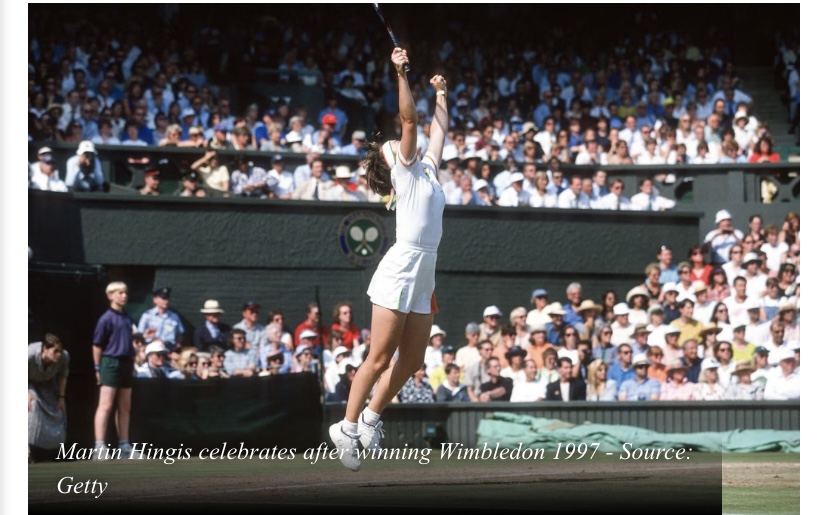
In 1997, a 16-year-old Martina Hingis made history at Wimbledon by winning her first and only singles title at the prestigious grass-court event. It was a moment that would mark the pinnacle of her early career, cementing her place among tennis’ greats. Coming into the tournament as the top seed, Hingis was in sensational form, having reached the final without dropping a single set. But what made her triumph even more noteworthy was that it came in a year when the dominant Steffi Graf, the two-time defending champion, was absent from the tournament due to knee surgery.
In a thrilling final, Hingis faced the third-seeded Czech player Jana Novotna, who proved to be a formidable opponent. Novotna started strong, taking the opening set 6-2, but Hingis showed her resilience and skill, bouncing back to claim a 2-6, 6-3, 6-3 victory. The win secured her place in tennis history as one of the youngest Wimbledon champions in the Open Era, just one year after she had lost in the French Open final to Iva Majoli.
A Triumph Fueled by Hunger
Hingis later reflected on how her loss in Paris motivated her to push herself even harder at Wimbledon. “I felt because I didn’t win the French Open, the more hungry I was to win Wimbledon that year,” Hingis shared. “If I had won the French Open, I may already have been satisfied and maybe I would have taken it easier at Wimbledon.” Her hunger for victory was palpable, and it was this intense drive that helped her overcome the challenges in the final to lift the trophy.
Interestingly, Hingis also remarked on the absence of Steffi Graf that year, acknowledging the role that played in her success. Graf, who had been the dominant force in women’s tennis, had won Wimbledon in 1995 
A Storied Career Beyond Wimbledon
Despite her remarkable Wimbledon victory, Hingis would not manage to repeat the feat in subsequent years. However, her career remained incredibly successful, and she became one of the most accomplished and versatile players of her era. Hingis went on to win 25 Grand Slam titles in total—five in singles, 13 in women’s doubles, and seven in mixed doubles—showcasing her adaptability and skill across different formats of the game.
Though her time at the top of the singles game was relatively short-lived, Hingis’ legacy as one of the sport’s greats was never in doubt. Her combination of intelligence, technical precision, and unmatched court awareness made her one of the most difficult players to face.
After stepping away from tennis in 2017, Hingis’ final tournament appearance at the WTA Finals saw her reach the semifinals, a fitting conclusion to a storied career. She was celebrated not just for her victories, but for the sheer elegance and flair she brought to the game.
Martina Hingis’ lone Wimbledon singles title in 1997 remains a landmark achievement in her illustrious career. It was a victory born of determination, hunger, and the drive to make up for her earlier French Open disappointment. While she never won Wimbledon again, Hingis went on to enjoy a career full of Grand Slam success and cement her legacy as one of the most gifted and successful players in tennis history.
Reflecting on that Wimbledon triumph, Hingis acknowledged the role of circumstance, with Steffi Graf’s absence providing an unexpected opening. But it was Hingis’ own talent and tenacity that ultimately allowed her to seize the opportunity and achieve greatness. And while it was only one Wimbledon title, the impact it had on Hingis’ career and on the tennis world remains unforgettable.
Leave a Reply